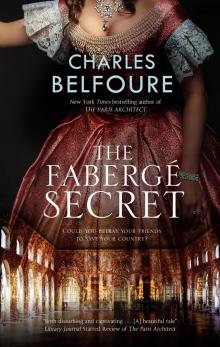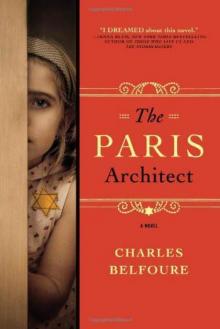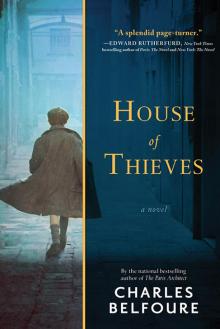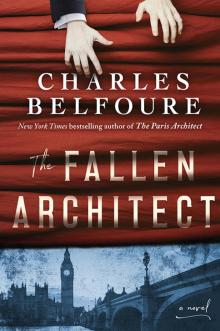- Home
- Charles Belfoure
The Fabergé Secret Page 7
The Fabergé Secret Read online
Page 7
‘I wanted to see you before you went off to Italy. Where are you staying?’ he asked.
‘Palazzo Volpi in Venice.’ Ekaterina propped herself on one elbow. The white silk sheet slid away, showing her beautiful full breasts.
‘Ah, yes, a wonderful place. We stopped there the year before last on the way to Nice,’ Dimitri said approvingly. ‘Then will you go on to your villa in Capri with the Baron?’
‘Yes, the eunuch will be coming down later on. But you must come by for a visit.’ Ekaterina kissed him full on the lips. ‘I love the taste of tobacco on a man.’ Dimitri snuffed out his cigarette and lay on his stomach. Ekaterina pulled the sheet off him to expose his naked body. Straddling his thighs, she began to run her hands over his back, starting at the shoulders. He had a muscular V-shaped torso that pinched down to a narrow waist.
‘Mm, that feels so good,’ Dimitri murmured.
‘You have the most wonderful body, Prince Dimitri. The part I love best is your little rock-hard buns,’ said Ekaterina as she clenched his buttocks with both hands. ‘I wish I could take them home with me, but I know that Countess Trigorin admires them also. How is she doing these days?’
Russian aristocrats had a main lover, but they could also have a few auxiliary lovers at the same time. Illicit Court love was like a game of musical chairs, but with plush beds – round and round you went.
‘I’m seeing her this coming Saturday. I’ll give her your regards,’ replied Dimitri cheerfully. He meant it, too.
Ekaterina got off the bed to start dressing. ‘I saw Lara at Worth’s last week. My old Smolny classmate is still so beautiful, and you know she was top of the class every year?’
This remark jolted Dimitri’s memory. Lara, along with other daughters of the aristocracy, attended the Smolny Institute for Young Ladies of Noble Birth in St Petersburg, Russia’s most prestigious girls’ school, founded by Catherine the Great. The image of his wife dressed in a plain white cotton jumper with starched navy-blue shoulder capes brought a smile to his face. Girls learned all the necessary skills to be a society lady, such as riding, dancing, archery, and tennis. They were also taught languages, science, mathematics, and classical subjects. When they first married, Lara impressed him so with discussions about literature, history, and philosophy. He’d forgotten how smart and well-read she’d been. That happy memory had long vanished along with her fidelity. He missed it. Despite her sharp intelligence, Lara was now as idle as any Court lady who started each day with a massage while gossiping on the telephone. The gossiping continued through the morning with her manicurist and then her personal hairdresser. When she was finally dressed, she’d shop on the Nevsky Prospect with her friends or go for a carriage ride. Back home, she’d dress for a ball or the opera. Dimitri and Lara never talked about anything except their social schedule, and she didn’t read anything except the society news to make sure she was mentioned.
‘Yes, I do remember she was an excellent student,’ Dimitri muttered.
Ekaterina slipped on a yellow satin morning dress embroidered with white lace, a loose dress with flowing skirts and sleeves. When she returned home, she would change into a day dress for her afternoon carriage ride and shopping, then a tea dress, and then an evening gown. Court women changed clothes about four times a day, six during the season. Dimitri was glad he wasn’t a woman. He got out of bed to change into a comfortable dark gray three-piece tweed suit he always wore on days when he was doing his architectural work.
He was ready to leave. He gave Ekaterina a passionate kiss.
‘Au revoir, ma chère. Have a good time in Venice and Capri. But before I go, I realized that I never gave you your Easter present.’ He pulled a tiny box out of his side pocket. ‘It’s a few months late, but I think you’ll like it.’
Ekaterina opened it. ‘Oh, Dimitri, it’s darling!’
Not all Fabergé eggs were Imperial Easter Eggs; the firm designed many miniature eggs, like the ‘Raspberry Egg’ Ekaterina held up to the morning light. It looked exactly like a red raspberry, but it was made up of dozens of tiny red rubies set in gold. All the little eggs had a gold loop at the top to attach to a simple gold necklace.
‘You not only have a great ass, Dimitri, but you’re the most thoughtful person I know. You remembered raspberries are my favorite fruit.’ She blew him a kiss, and he left.
Out on the street, he could feel the heat of the day coming on. There was barely any spring in St Petersburg, summer engulfed the city so quickly. He didn’t have far to walk to his mansion on the Quay overlooking the Neva River. Fifteen minutes later, the Baroness emerged onto the street and headed home. She didn’t notice that far down the street a carriage waited. In it, her husband Baron General Igor Moncransky was smoking a cigar.
Moncransky had unfastened a few buttons of his scarlet and gold-braided tunic because it had gotten uncomfortably close in the carriage. He was a general in the Hussars Regiment of the His Majesty’s Life Guards and head of the Okhrana, the feared Imperial Russian Secret Police. The general was formally addressed as ‘Your Super-Excellency,’ and God help the officer who didn’t use the proper salutation. Once he challenged a man to a duel for the slip in etiquette. He watched his wife turn the corner on the way back to their house on the Moika Canal. It was by accident that he discovered that she and Markhov were lovers when he went to his dacha on the shore of the Gulf of Finland in the early spring, and saw them leaving together.
Moncransky always had an intense dislike for Prince Dimitri, which he expertly disguised in Court because Dimitri was the Tsar’s closest friend. Moncransky hated and envied him for his closeness to the Imperial Family. He also despised the prince because of his good looks and trim physique. Moncransky believed he should be a close friend and confidant to Nicholas, who was always very cold and formal with him. Markhov wasn’t even a career military man; just a dilettante architect and engineer. An aristocrat who worked was an abomination, he believed. Once when Moncransky criticized a bridge Markhov had designed, he replied it was designed specially to hold the weight of the cannon of supporting artillery units, thus embarrassing him in front of the Tsar. Moncransky never forgot an insult.
The general puffed away on the cigar. He didn’t mind his wife taking lovers. Under the Court’s unwritten rules, she was allowed to because she’d produced a male heir for him. After that, she was a free agent if she acted with discretion. He was a soldier, and it was expected that he take lovers and frequent the best class of brothels. But he bitterly hated the fact that Markhov was her lover. He tossed away his cigar and growled at the young fresh-faced soldier driving his carriage.
‘I have an appointment at the Winter Palace in ten minutes, so move it, son!’
The front west wing of the Winter Palace was where the government ministers’ offices were located. Moncransky left his carriage and went in through a side entrance. A liveried footman opened a door to an office suite. There sitting and smoking were von Plehve, the Minister of the Interior; Grand Duke Sergei, the Tsar’s uncle; General Isvoltsky, the Okhrana’s second in command; and several other under-ministers and officers.
‘You’re late,’ growled Grand Duke Sergei.
Looking contrite, Moncransky bowed, then took a seat. Isvoltsky was the first to speak. He opened a large brown envelope and removed a piece of white paper.
‘The next pogrom will be in Gomel next Wednesday. Our people are in place, and the police have been instructed not to interfere. These flyers will be scattered throughout the city and the peasant villages the week before.’ He held the paper up for all to see.
Printed in big letters was ‘Kill the Jews & Save Russia.’ A sentence under it said, ‘Revolutionary Jews are overthrowing our Empire and want to kill the Tsar and his family.’
‘I hope this doesn’t cause a big stink like the one we put on in Kishinev,’ muttered Grand Duke Sergei to no one in particular.
‘Have your men kill a Christian,’ von Plehve ordered Isvoltsky. ‘That really riles the pe
asants. We want to be sure this pogrom will be a success.’
NINE
Ivan Plechenko stuck his head through the broken glass of the window.
‘Kill the Jews and save Russia!’ he shouted at the top of his lungs.
A great cheer rose up from the street below. Plechenko was delighted to see a mass of men throwing rocks through windows and running out of houses with their arms full of looted silverware and linen. Directly across from him, two young men were taking turns with a rusty crowbar bashing in the head of a bearded middle-aged man. Fire was pouring out of the first floor of a house at the end of Kirov Street in the Jewish quarter of Gomel.
Plechenko felt a wonderful sense of elation that seemed to lift him a finger’s breadth off the floor. And it wasn’t because of the copious amounts of vodka he had already drunk this morning. No, it was the sight of the blind senseless carnage going on around him. To be caught up in this great frenzy, to be able to go completely wild and destroy anything that could be broken, smashed, set on fire, or killed without consequence – that made his heart soar. It made him feel so alive and happy to be part of such a business.
Smiling, he turned and faced the room. He repositioned his visor cap atop his mop of unruly sandy-blond hair and smoothed out his white cotton blouse that buttoned up the side and hung outside his baggy wool pants. He bent down and wiped off the dust off his most prized possession, his black knee-length boots. Leather boots were a sign of status; peasants usually wore crude sandals made of bark from lime trees. He had pulled these fine boots off a passed-out drunk in Orgeev a year ago. In front of him, the woman lay on the floor sobbing hysterically over her husband whom Plechenko had just savagely beaten.
A door opened to his right, and the clean-shaven face of a lean sunburnt peasant poked out.
‘Ivan Sergeyevich, come see what we’ve found,’ shouted the young man. As he was pulling his head back from the door, he took notice of the young woman on the floor.
‘Say, these Jewesses aren’t bad-looking, are they? Where’d she come from?’
As Plechenko walked into the room, the moujik named Iyla whom he had met a few hours before in Zuniski Square slid by him unbuttoning his fly. Iyla straddled the woman, who looked up at him and started screaming.
When Plechenko entered the small room, he began to laugh uncontrollably. The entire room was filled with floating white feathers. It was like it was snowing inside the house, and he understood why. Across the room was a stout, red-haired man ripping apart a mattress with a short-bladed knife. Billows and billows of the tiny goose-down feathers spewed out. They stuck to his hair and clothes.
‘Look!’ yelled the man with glee as he held up a leather pouch. He shook it, and it jingled. ‘I knew the Jews hoarded their rubles in their mattresses, I just knew it!’ He continued his hunt, ripping apart the rest of the cotton covering. Plechenko’s eyes lit up when he heard the jingle of coins. There was another bed in the corner of the room. He pulled out his jack-knife and leapt on its mattress, slashing it apart in a fury. He howled with pleasure when he found a pouch. Delirious with joy and covered in feathers, he ran out of the room and into the street, where the chaos had escalated. Wafting from the windows and doors of the houses he passed were goose feathers. Flames were licking out of the front windows of more houses on the street. One was totally engulfed in fire. The family who must have lived there was silently watching the inferno from the middle of the street. The white-bearded elder was clutching in the crook of his black coat sleeve one of those candelabras the Yids used for that holiday around Christmas. Right at the very moment Plechenko was watching, a skinny boy of about thirteen struck the old man in the back of the head with a piece of firewood and snatched the candelabra from his grasp. Plechenko convulsed with laughter and offered the boy a salute of admiration, which the kid enthusiastically acknowledged. The boy pointed to his booty and shouted proudly, ‘This is pure gold!’
Plechenko realized he was covered head to toe in feathers. ‘It looks like I’ve slept in a chicken coop,’ he said with a laugh and began brushing the feathers from his hair and blouse. He pulled off his tunic and shook it like a blanket to get the feathers off. They seemed to be glued to his clothes. Once he was tidied up, he walked down the street bouncing the dark-brown leather pouch of coins in the palm of his right hand. He passed at least three buildings that had crosses or Orthodox ikons in their windows, a very smart move, he thought, to keep the rioters away.
He passed some local policemen smoking and leaning against a brick wall of a house occasionally looking left and right but mostly looking straight ahead. They were all dressed in ill-fitting light-blue uniforms with short yellow epaulets and caps with scarlet banding.
An ancient woman in a black shawl limped up to them. ‘Aren’t you going to stop this?’ she screamed.
‘It’s none of our business, cabbage-face,’ mumbled an officer whose big belly was about to burst out of his tunic.
‘The Tsar himself ordered this, grandmother!’ yelled Plechenko, briskly walking down the street.
TEN
‘What do you mean, you’re not going? You’ve never missed Prince Kovrin’s party. He has that spicy Black Sea sturgeon you love so much.’
With a quizzical look on her face, Lara stood with her hands on her hips at the doorway of Dimitri’s bedroom.
‘Like I said, I’m not going.’ Dimitri was sitting in an armchair, smoking a cigarette and reading a magazine. Instead of evening attire, he was wearing his three-piece tweed suit.
‘Your little Countess Trigorin will be there – without the Count,’ Lara said in a devious tone.
‘You can go without me.’
‘You know damn well I will,’ she growled. ‘I didn’t buy this gown to stay home with you.’
‘Tell them I wasn’t feeling well. Anyway, no one will miss me,’ Dimitri said in a weary voice. It was true; they went to a party or a ball every night of the week, no one would notice his absence. Sophie, Lara’s lady’s maid and confidante, came up behind her and put a wrap around her shoulders and handed her a pearl-embroidered silk purse. A big brown and white borzoi trotted into the room.
‘There’s my handsome boy! You’ve come to say good night to your mama, Fedor?’ Lara knelt down and wrapped her arms around the dog. She kissed Fedor on his snout, and he wagged his tail furiously. ‘My baby, I wish I could take you with me. But you go sleep on mama’s bed.’
A young girl in her twenties wearing a black dress stood at the door.
‘Varinka, please make sure Fedor gets his treat after I leave,’ Lara said. ‘The fresh duck.’ Varinka’s sole duty as a house servant was to take care of the dog.
‘Yes, Your Highness,’ Varinka squeaked.
‘So, what will you be doing tonight, if you’re not seeing your Countess or gorging on sturgeon?’
‘I’ll be working on the drawings for the Tchaikovsky Memorial,’ Dimitri responded, trying not to show his irritation.
‘Don’t wait up, I’ll probably be horribly late,’ Lara said with a wink. ‘You know what Kovrin’s parties are like.’
‘I know what you’re like,’ he said.
‘Everything in moderation,’ he added without looking up from his magazine.
‘Including moderation, said Oscar Wilde.’ Lara waved goodbye.
Dimitri took another cigarette out of his case and lit up. He coughed and picked a piece of tobacco from the tip of his tongue. Little Olga was right, he smoked too much. Fedor walked over to Dimitri’s armchair and curled up to sleep. Gazing into the fireplace, he was glad he wasn’t going to Kovrin’s. It all seemed so silly, compared to real life where people were intent on murdering someone. The attempt on the Tsar’s life with the plague-infected cloth; he could not understand what the Tsar had done to deserve this. Then he remembered the child in Kishinev. What had he done to deserve a bashed-in skull?
He went over to the window that looked over the Neva, and watched Lara drive off in the night in their carriage. As he
threw his unfinished cigarette into the fireplace, Dimitri checked the time on the Fabergé mantel clock.
‘Alexsandr,’ he shouted to the ceiling, ‘fetch me a droshky.’
‘Oh, come now, Russian modernism acknowledges the art and science of the West, but it definitely tailors them to Russian tradition and symbolism. We’re producing our own special kind of painting and literature,’ said Katya. She was wearing a green silk dress, standing in front of the great fireplace, waving her cigarette to emphasize her point.
The other men and women in the room seated in plush sofas and armchairs were nodding and holding glasses of tea. Before them, on a table set with a white lace cloth, a silver samovar was bubbling away.
A young man in a navy-blue suit with a waistcoat leaned forward to pour himself more tea. ‘It’s a cultural rebirth – but a Russian one,’ he said enthusiastically.
‘Just look at the Moscow Arts Theater,’ exclaimed a middle-aged woman. ‘That in itself set the Russian standard for the arts for the world.’
The dozen or so people turned in unison when the doorbell chimed. Off in the entry was a mumbling of voices, then footsteps on the marble steps were heard.
Katya looked up in surprise.
‘Prince Dimitri, how good of you to come,’ she said.
All eyes set upon the tall, handsome aristocrat holding his hat and walking stick in hand. The butler came up, and Dimitri threw his gloves in the hat and handed it and the stick to the servant.
He smiled at Katya and bowed. ‘I remembered that you met on Thursday nights, and so I happened to be free tonight.’
‘Everyone, may I present Prince Dimitri Markhov. He’s an architect.’

 The Fabergé Secret
The Fabergé Secret The Paris Architect: A Novel
The Paris Architect: A Novel House of Thieves
House of Thieves The Fallen Architect
The Fallen Architect